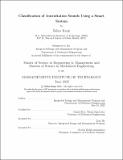Classification of Auscultation Sounds Using a Smart System
Author(s)
Kanji, Zahra
DownloadThesis PDF (3.607Mb)
Advisor
Frey, Daniel
Terms of use
Metadata
Show full item recordAbstract
Respiratory diseases are a leading cause of death worldwide. Despite modern medicine, treatment of lung diseases is limited by the tools available to diagnose these disorders, especially in low resource settings. While tools such as chest x-ray and CT scans are highly accurate, their high cost provides a high barrier for many patient populations. The physical exam has been a long standing tried and true method that provides a low cost solution for for diagnosis of many common lung diseases including pneumonia. However, this method is subjective and its sensitivity is limited to the operator ability.
Lung sound classification and using a digital stethoscope can be used to provide an immediate diagnostic for respiratory-related diseases. The International Conference on Biomedical and Health Informatics (ICBHI) created a sound data base in 2017 that is annotated with a classification of the lung sound by physicians. In this thesis, artificial intelligence libraries are used in a deeo learning architecture to identify and classify the lung sounds. The data set was split into training and test data and evaluated using standard performance metrics: precision, 92.3%, accuracy, 87.3%, sensitivity (recall), 87.1%, specificity, 87.5% and F1 Score, 0.89%. Because the data set is skewed right, the best evaluation metric is the F1 Score, which is a weighted average of precision and sensitivity. The F1 score was found to be better than other comparable known attempts on this same data set.
The space for new, innovative, portable and affordable diagnostic devices that aid patients towards pulmonary health and wellness will likely push the development further of the acceptance of electronic auscultations. As telemedicine grows, this will also drive up the demands for such devices. Other holistic measures that are used in medicine will likely also be be developed as the landscape of healthtech changes what is possible.
Date issued
2022-05Department
Massachusetts Institute of Technology. Department of Mechanical Engineering; System Design and Management Program.Publisher
Massachusetts Institute of Technology